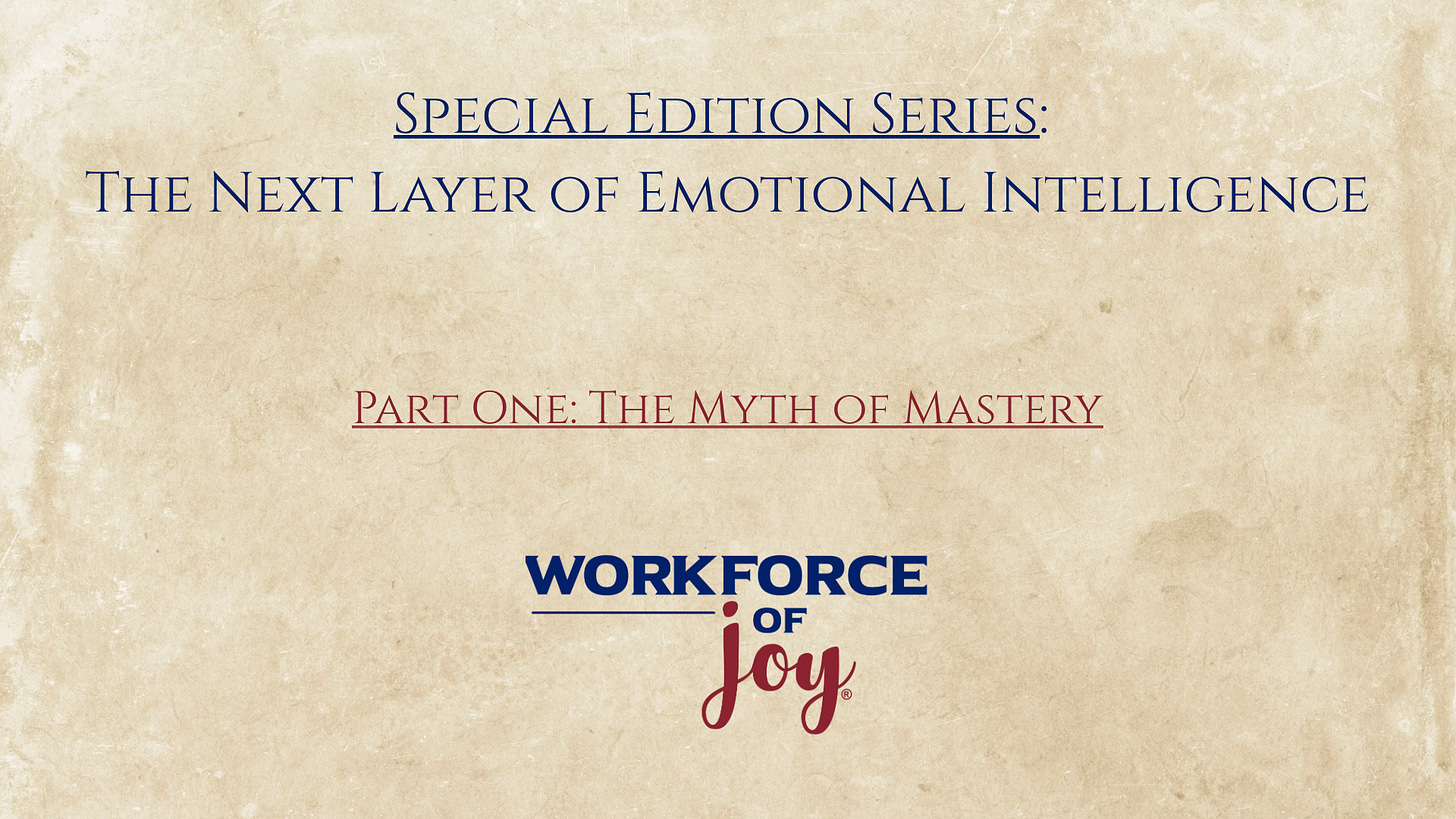This is a special edition of Workforce of Joy, a seven-part series that takes an intentional deep dive into one of the most talked-about, often misunderstood, and rarely outgrown leadership qualities: emotional intelligence.
Most content on EQ is written for those who are just beginning the work. This series is not. It’s for those of you who already live and breathe it. For the trusted ones. The steady ones. The ones who’ve spent years practicing self-awareness, empathy, emotional regulation, and relational fluency.
This is a deeper layer. Not a rehash of skills, but a return to curiosity. A reintroduction to the parts of ourselves that mastery may have quietly muted.
We’ll return to the heart of EQ, not as something to perform, but as something to be in active relationship with.
Let’s begin.
⸻
Part One: The Myth of Mastery
If you’re reading this, chances are you’re the person others go to when things get hard. You know how to hold space. You know how to listen, how to reflect, how to pause when you’re activated and find language for what’s really going on.
You know how to name emotions without being consumed by them. You’ve read the books, practiced the frameworks, and used those skills in real moments that mattered, at work, at home, and within yourself. You’ve become fluent in the language of emotional intelligence.
And that’s exactly where the trouble starts.
Because somewhere along the way, fluency can turn into autopilot.
You get so good at noticing your emotions that you stop letting yourself feel them. You get so good at understanding other people’s pain that you stop acknowledging your own. You become the grounding force in every room, until it starts to feel like you’re playing a role instead of living a life.
That’s the myth of mastery, that once we “get good” at EQ, the work is done.
But emotional intelligence isn’t a skill you conquer. It’s not a box you check off. It’s a living thing. And like anything living, it needs fresh oxygen.
What I’ve seen, especially in seasoned leaders and deep feelers, is that EQ becomes a kind of protective gear. You learn to regulate instead of react. You learn to empathize instead of judge. You learn to stay composed instead of unravel. And all of that is powerful. But sometimes, those same strengths can quietly turn into constraints.
If you always stay regulated, when do you let yourself be raw?
If you always empathize, when do you let yourself have boundaries?
If you always stay composed, when do you let yourself be known?
I once worked with a leader who had impeccable emotional control. In meetings, she could calm a tense room in seconds. People felt safe with her. She was the one who could be counted on to “fix it.” And yet, she hadn’t cried in over a year. Hadn’t let herself fall apart. Hadn’t said “I don’t know what to do” out loud in a very long time.
She wasn’t just leading the room. She was disappearing inside of it.
That’s when we started having a different conversation. One that wasn’t about better EQ techniques, but about what her emotional intelligence had stopped her from expressing. Where it had become armor. Where it had become habit instead of truth.
This is the work I want to invite us into.
Not to dismantle our EQ, but to let it evolve. To stay curious. To be brave enough to admit when our strengths have outgrown their original shape.
So here’s your invitation for now:
Don’t audit your emotions. Don’t try to name them perfectly. Just let yourself notice where things feel flat. Where you’re playing a role instead of being in relationship. Where your well-worn wisdom is asking for something new.
In the next part of this series, we’ll talk about emotional fractals, how tiny, often invisible patterns repeat across the moments of your day, and what they might be trying to show you. But for now, I’ll leave you with this:
Even mastery needs renewal.
You haven’t outgrown your emotional intelligence. You’ve just grown enough to begin again.
In reflection,
-Michael



